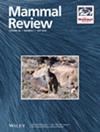Interference competition driven by co-occurrence with tigers Panthera tigris may increase livestock predation by leopards Panthera pardus: a first step meta-analysis
IF 4.4
2区 生物学
Q1 ECOLOGY
引用次数: 0
Abstract
In coexisting carnivorans (Carnivora) relying on the same food resources, the dominant species imposes a cost on the inferior competitor by limiting its foraging ability. Tigers Panthera tigris and leopards Panthera pardus live in sympatry in most Asian countries and, because of their similar trophic niche, ‘interference competition’ may exist between these two predators. In fact, since tigers generally occupy prime habitats, leopards could be forced to roam into peripheral areas that are heavily used by humans to avoid competition, consequently increasing the risk of human‐leopard conflicts. Using information collected from the reviewed scientific literature, the purposes of this work were: 1) to assess if livestock predation by leopards increases in areas of coexistence with tigers, and 2) to characterise leopard attacks on livestock to discern the main factors involved in the human‐leopard conflict. Our findings showed that the leopard's ‘overall’ livestock predation rate (i.e. individuals taken/year) was higher in the absence of tigers than in their presence, and the same was observed for the ‘sheep and goat’ predation rate. These results confirm the leopard's tendency to take livestock and, especially, smaller prey. Conversely, the ‘cattle’ and ‘other’ predation rates were higher in the presence of tigers than in their absence, suggesting the existence of a sort of spatial segregation between predators in certain contexts. Lower levels of predation by leopards were observed on farms in which more prevention measures were used, than in those in which only one measure was implemented. We stress the importance of using proper prevention measures to mitigate human‐leopard conflicts. However, because their implementation may not be easy or economically feasible, the financial support given by carnivoran‐policy makers assumes remarkable importance to minimise the economic impact on local families and, in turn, to foster the coexistence between leopards and humans in shared landscapes.与老虎共同发生的干扰竞争Panthera tigris可能会增加豹子对牲畜的捕食Panthera pardus:第一步荟萃分析
在依赖相同食物资源的共存食肉动物(食肉目)中,优势物种通过限制劣势竞争对手的觅食能力来施加成本。虎(Panthera tigris)和豹(Panthera pardus)生活在大多数亚洲国家,由于它们相似的营养生态位,这两种掠食者之间可能存在“干扰竞争”。事实上,由于老虎通常占据主要栖息地,豹子可能被迫漫游到人类为避免竞争而大量使用的周边地区,从而增加了人豹冲突的风险。利用从科学文献中收集的信息,本研究的目的是:1)评估在与老虎共存的地区,豹子对牲畜的捕食是否会增加;2)描述豹子对牲畜的攻击,以识别人类与豹子冲突的主要因素。我们的研究结果表明,在没有老虎的情况下,豹子的“总体”牲畜捕食率(即每年捕获的个体数)高于有老虎的情况,在“绵羊和山羊”的捕食率中也观察到同样的情况。这些结果证实了豹子捕食牲畜的倾向,尤其是较小的猎物。相反,在老虎存在的情况下,“牛”和“其他”的捕食率比没有老虎的情况下要高,这表明在某些情况下,捕食者之间存在某种空间隔离。在采取了更多预防措施的农场,豹子的捕食率比只采取一种措施的农场要低。我们强调使用适当的预防措施来减轻人豹冲突的重要性。然而,由于它们的实施可能并不容易或在经济上可行,食肉动物政策制定者给予的财政支持对于最大限度地减少对当地家庭的经济影响,进而促进豹与人类在共享景观中的共存,具有非常重要的意义。
本文章由计算机程序翻译,如有差异,请以英文原文为准。
求助全文
约1分钟内获得全文
求助全文
来源期刊

Mammal Review
生物-动物学
CiteScore
12.20
自引率
4.10%
发文量
29
审稿时长
>12 weeks
期刊介绍:
Mammal Review is the official scientific periodical of the Mammal Society, and covers all aspects of mammalian biology and ecology, including behavioural ecology, biogeography, conservation, ecology, ethology, evolution, genetics, human ecology, management, morphology, and taxonomy. We publish Reviews drawing together information from various sources in the public domain for a new synthesis or analysis of mammalian biology; Predictive Reviews using quantitative models to provide insights into mammalian biology; Perspectives presenting original views on any aspect of mammalian biology; Comments in response to papers published in Mammal Review; and Short Communications describing new findings or methods in mammalian biology.
 求助内容:
求助内容: 应助结果提醒方式:
应助结果提醒方式:


